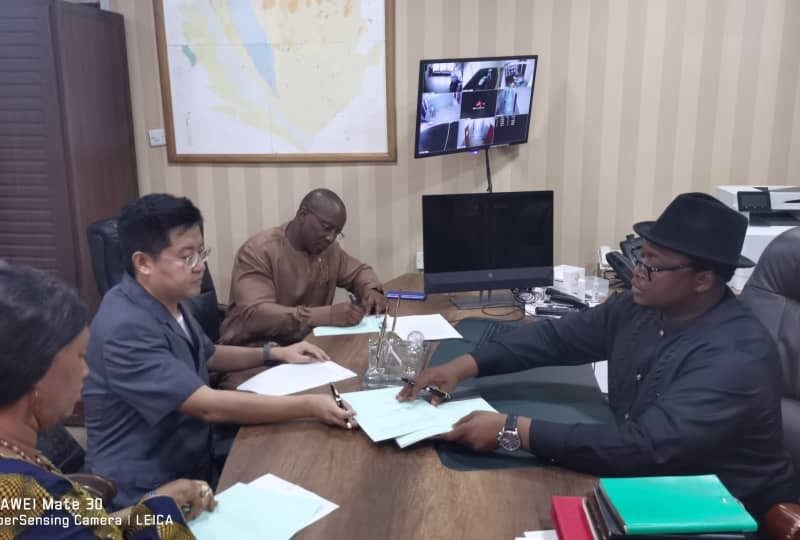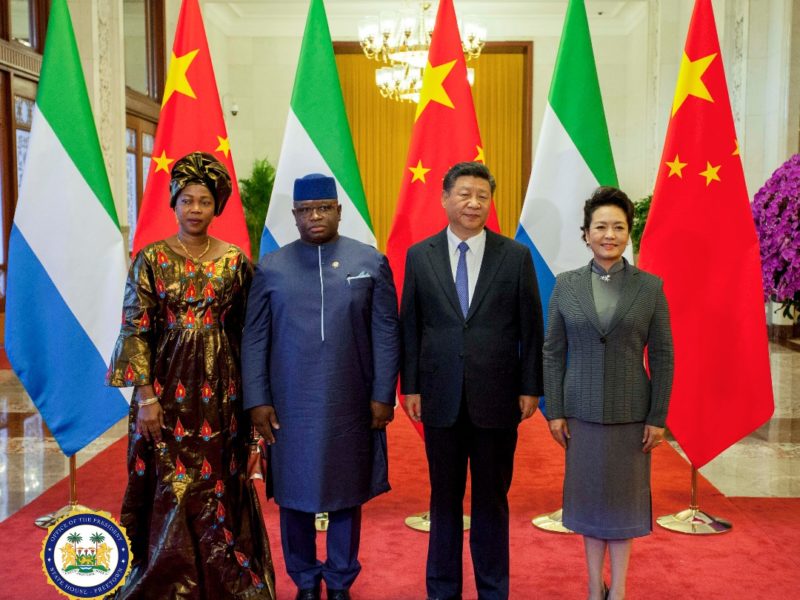The Growing influence of China in Sierra Leone
Since July 29, 1971 when President Siaka Stevens signed diplomatic ties with the People’s Republic of China (PRC), so much water has flown under the bridge of that formal relationship. One that has defined this long standing partnership with often conflicting interests. While China is seeking to expand its access to Sierra Leone’s mineral resources and acquiring infrastructural investment projects; Sierra Leone, on the other hand, is being lured into China’s unconditional low interest loans with absolutely no desire to be involved in its governance parameters. That has been the economic fuel which has ignited the flame of China’s growing influence in the West Africa nation of Sierra Leone. (Photo: M C Bah, author)
China by every indication continues to turn blind eyes to the cesspool of corruption by some Sierra Leonean government officials. The hidden reasons behind that are: Chinese companies independently use their own native work force without Sierra Leonean workers and roll out millions of dollars of infrastructural investments for Beijing’s economy. China, unlike Sierra Leone’s traditional donors like Britain and the EU, have no political interest in helping Sierra Leone build its fragile democratic institutions or promoting the practices of good governance. With its Infrastructural focus on building roads and dams, hospitals and telecommunications networks, water system and energy security, many Sierra Leonean high level government officials are using these “national projects” to enrich themselves at the expense of the people.
Today, the government of President Ernest Bai Koroma’s China policy is defined as one of the center piece of his developmental agendas. That is: making a pilgrim to the holy city of Beijing almost every month and begging the Chinese to give them more money to pay for national development programs or what is commonly called the “agenda for prosperity.” President Koroma has forgotten that our traditional allies like Britain and the European Union (EU) provide more aid to Sierra Leone than the Red Dragon nation of China. And our friendship with the EU is principally based on the mutual understanding of promoting democracy, providing transparent institutions and advancing the goal of good governance.
Perhaps, no one puts it better to describe the China-Sierra Leone relationship like Simone Datzberger, a onetime PHD candidate of International Relations from the London School of economic that: “Chinese investment in Sierra Leone is unquestionably extremely important and may promote overall economic growth in the country. This investment, however, may not necessarily lead to significant employment generation and effective poverty reduction in the long term.” Indeed, Simone Datzberger’s profound analysis embraces the perfect implication of China’s growing influence in a low income country that is still struggling to improve its economy.
In Sierra Leone today, the Red Dragon (China) seems to be the new colonial power –exerting tremendous influence – from bilateral trade agreements to Agriculture, health care, infrastructure, fisheries, energy security and education. In 2010, bilateral trade reached $109 million, and total Chinese direct investment was $51.2 million. And, China has emerged as Sierra Leone’s second largest importer and exporter after the European Union (EU). China’s main exports to Sierra Leone include: mechanical and electrical products, textiles and other light industrial goods, cultural and educational materials, hardware and articles for daily use.
Presently, there are 30 Chinese companies operating in Sierra Leone. Their primary reason: a huge commercial interest to extract Sierra Leone’s mineral resources. While African Minerals and London Mining seem to be gaining grounds on this significant ventures, the Chinese are on a “stand by” waiting to make a giant entry into Sierra Leone’s mineral fields. Chinese companies are playing the “silent storm” strategy to occupy and conquer many of these mining fields in the next decades to come. And many visionless politicians are working with some of them to realize this exploitative mission. China may be looking to expand its circle’s of influence by purchasing radio stations, building new television networks and even acquiring local newspapers in the near future.
Nonetheless, looking at China as an infrastructural developer for Sierra Leone, they have made significant progress on the Freetown urban landscape from the multi-use national stadium to Youyi building (ministerial complex).Over the past decades; they have built bridges, power transmissions, a dam and some roads. More recently, the Chinese contractors finished constructing a new foreign ministry building, additional offices for parliament and the 100-bed China Sierra Leone friendship hospital at Jui, outside of Freetown. And President Ernest Koroma, early in July, 2013 signed a deal with Chinese Railway International Company to build a new airport and a railway amounting in total of $ 8 billion. Thus, China has significantly supported some level of economic growth for Sierra Leone.
However, the Dragon nation’s influence is attributed to the incompetent leadership of our governance capability and the “non-strategy approach” to translating such infrastructural developments to the benefit of Sierra Leoneans. For instance, the Chinese construction of the Wilkinson and Spur road was riddle with corrupt practices from the Ministry of Works and Ministry of Finance. The improper coordinating system with other related Ministries like Energy and Power also caused a long delay of the project completion. The Wilkinson Road/Spur Road project serve as a prime example of why accountability and transparent local partners with strong state institutions are needed to ensure that Chinese investment is ultimately for the greater good of Sierra Leone.
According to leak documents from the Ministry of Finance, the government of Sierra Leone paid $18 million for the 4km- long Wilkinson Road. The unit price charged was roughly $4.5 million a kilometer compared with internationally accepted average price of $250,000.This project was not only expensive and costly but was piloted with corrupt hands that mercilessly defrauded our nation. And China’s influence has been measured by the ability of its counterpart (Sierra Leone) to enjoy “non-interference” in appropriating and disbursing donor assistance without conditions or limitations. Apparently, the lack of transparency and the poor oversight responsibility by parliament itself have allowed such serious national problems to continue unabated.
On the telecommunication front, the state of poor network services in Sierra Leone could be traced to some of the low graded electrical components imported and installed by China’s Huawei Technologies Co, Ltd. The government owned Sierratel Company particularly and many other mobile phone services continue to witness troubling network failures because of the lack of regulations and oversight responsibility by NATCOM. With a diversified investment strategy to attracting more foreign companies like Nokia, Samsung and Motorola, major problems like telecommunication failures could be solved with updated technologies and better services for the people of Sierra Leone.
On the contrary, Sierra Leone is grateful to President Koroma for the construction of the China Friendship hospital at Jui – outside of the capital city of Freetown. The need for an ultra modern hospital with optimal care from diagnostic machines to CT- Scan and other medical technologies are long overdue. Every progressive oriented Sierra Leonean welcomes such improvement especially when our citizens have to travel outside of Sierra Leone for adequate medical emergencies. However, the government has not provided a cost recovery solution to assisting poor citizens who cannot afford to pay for treatments and medical care at the China Friendship hospital.
Furthermore, the Ministry of Health has not developed a subsidized program or an insurance premium network that will cover the cost of care for millions of low-income families and especially older people. Thus, the health care sector must be overhaul and streamline to include not only a brand new facility but educating Sierra Leoneans as nurses, radiologists and doctors, building a frame work of subsidized care and making health care affordable and accessible to everyone. Otherwise, the Sierra Leone friendship hospital will be a place where millions of Sierra Leoneans cannot afford to seek medical care.
Nevertheless, the growing influence of China can be contained or balanced if the government of Sierra Leone is willing to work for the interest of the people. Both countries stand a better chance of forming a permanent and true friendship if the goal is one of collective economic growth. Donor countries like China could play an important role in assisting Sierra Leone to maximize benefit from foreign investments and even private sector development. For example, Sierra Leone should negotiate stricter trade and investment agreements that promote job creation for the youths. That is: 90% of the workers from every Chinese company should be drawn from Sierra Leonean workforce and government should use such priority as the benchmark of signing investment deals.
Indeed, the dragon nation may build a partnership of economic cooperation but it is up to the leadership in Sierra Leone to translate such relationship into tangible and resourceful outcomes. Pragmatically, the attitudes and minds of our leaders must change. This obsession to acquire wealth from state resources is abominable and immoral. It should not be the big elephant in the room when trade deals and infrastructural projects are signed at the red carpet ballroom of Beijing. Sierra Leoneans in the streets want to see changes that make their life better and prosperous – not only politicians and their families. The cycle of poverty needs to stop and the rebirth of a new era of genuine progress must start now.
To leave lasting legacies that transform struggle lives and lifting a generation from abject poverty are some of the essential obligations of public service. This politics of greed, treacherousness and selfishness by politicians today are detrimental to the economic wellbeing of our nation. Something eventually must be done to give our people the dignity and the reason to live in their homeland. We can only blame the Chinese so far. And we can neutralize China’s growing influence by becoming “genuine leaders” to the aspiration of our people – not solely looking out for few people and few families. It is indeed heartless to betray the trust of the people by doing the wrong things for personal gains.
Thus, Sierra Leone should develop genuine local partnership and build strong State institutions to provide transparency and oversight role in the activities of government and its donor friends. And trade negotiations or infrastructural projects must include creating more job opportunities for the local workforce, raising revenues through taxes and other incentives, enforcing labor laws that protect the local market from exploitation, designing laws that protect the mining, fishing and other service industries from waste abuse and fraud, promoting good corporate social responsibility from Chinese companies and expanding the fields of foreign direct investments. This should be the new path to formalizing a partnership of friendship that is productive and enduring.
Otherwise, the Sino-Sierra Leone relationship will be seen as a love affair base on “a marriage of convenience.” And China’s presence in Sierra Leone will be seen as the red dragon looking for hidden treasures at the mercy of the people. And we can only blame those giant sleeping lions – in the “lion mountain” – who could not wake up because of a field day from a hunting trip. China and Sierra Leone have shared desires to help their countries become wealthy and prosperous – both should undertake such pursuit without exploiting the other. And Sierra Leone must come to the table of progress with the understanding that partnership is about close relationships build on the “principle of trust.”Everyone must stand to benefit whether it is a short-term or a long-term venture.
By MC Bah- Atlanta, GA-USA
Stay with Sierra Express Media, for your trusted place in news!
© 2013, https:. All rights reserved.





